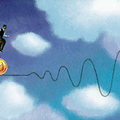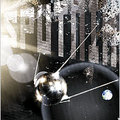| |
 | |
IT WILL not be the first time the great powers have gathered in Potsdam to sort out the aftermath of a long-running conflict. The city, where the Allies divvied Germany up after the second world war, will this weekend welcome the finance ministers from the G8 group of rich countries. Paul Wolfowitz, the World Bank’s president, is scheduled to join them—but as a defeated party. On Thursday May 17th, after a protracted struggle to save his job, he finally accepted defeat. Mr Wolfowitz is scheduled to leave the World Bank on June 30th.
Earlier this week a report written by seven of the bank’s directors concluded, with scathing language, that in the summer of 2005 he had broken the institution’s rules, breached his contract, and fallen short of the high ethical standards of his office. All of this in an effort to appease Shaha Riza, his girlfriend, who left her job at the bank when he took his. He smoothed his girlfriend’s exit, bowing to her demand for a hike in pay, sharp annual increases and a big promotion (or two) on her return. He should never have put himself in the middle of the dispute, the report argued, though he insisted he was only following his directors’ sketchy advice.
The scandal has eclipsed all the Bank's other efforts, and rendered him unable to lead effectively. On Thursday the White House seemed to acknowledge this reality. At a press conference in the Rose Garden, George Bush, who picked Mr Wolfowitz two years ago, said “I regret it has come to this.” Hours later, Mr Wolfowitz handed in his resignation.
With the his regime on the way out, optimists see blue skies opening up before them. Surely, the bank should now free itself of the unwritten rule that its president is always America’s choice, while the Europeans pick the head of the IMF. The bank should choose its next leader on merit, much as the World Trade Organisation selected its current head, Pascal Lamy. It should also cast its net widely. Why not get Kemal Dervis, an ex-World Banker who helped haul Turkey out of a financial crisis? Or even better, Ngozi Okonjo-Iweala, another bank alumnus who brought fiscal sanity to Nigeria as its corruption-fighting finance minister?
Unfortunately, the Americans are in no mood to cede their privilege. And having endured one war of attrition, the bank cannot now afford a second lengthy battle over its future. The next bank president, like the last, will be a Bush nominee. Some wags note that Tony Blair, Britain's prime minister, will be out of a job a couple of days before the World Bank post becomes available.
Others to consider would be Robert Zoellick, who served as Mr Bush’s trade representative and remains respected in international circles. Stanley Fischer, Israel’s central bank governor, would be a popular choice. An American born in Zambia, he has served as the bank’s chief economist and the IMF’s chief firefighter.
An old bank hand would start with some advantages. He would inherit a corps of 8,600 under-motivated staff in full command of a jargon and house culture that can bewilder new bosses. “The bank has a set rhythm,” says Ashraf Ghani, chancellor of Kabul University, who once worked there. “Anyone who masters its rhythm, runs the bank.”
But the next president will not have much time. He will arrive in the middle of a campaign to coax new money from donors; the very governments that last month fretted openly about the bank’s credibility and reputation. He will need to raise at least $25 billion this year just to keep the bank’s aid from shrinking in the medium term. Even before the past month’s controversies, some donors were balking at this bill. One or two European governments, Mr Wolfowitz thought, saw his troubles as a convenient excuse to renege on their financial commitments.
A bigger worry must be America. It remains the bank’s single biggest contributor, stumping up almost 14% of the money the last time the begging bowl was passed around. Given the tenacity with which it fought for its man, one might assume the White House cherishes the institution he led. In fact it cares little about the bank, and knows even less. The armistice it agreed on May 17th might have arrived sooner, but Mr Wolfowitz’s former colleagues seemed to put personal loyalties above their country’s interest, let alone the bank’s. Now some of the agency’s more hysterical critics think it has fallen to a European coup. The risk is that Mr Bush will take revenge by steering America’s money elsewhere.
That would further undermine the bank’s place in the world. It is already losing its most lucrative customers—such as Brazil and Mexico—to the capital markets, which now rush in where once only the bank dared to tread. And it faces stiffer competition for aid dollars from other, more fashionable conduits for generosity: the presidential plans, millennium accounts, global funds and so on.
Whoever succeeds Mr Wolfowitz faces a delicate balancing act. He must restore the morale of the bank’s staff while retaining the confidence of its American donors. The bank began its life rebuilding a war-blasted Europe. Now it must begin rebuilding itself.





